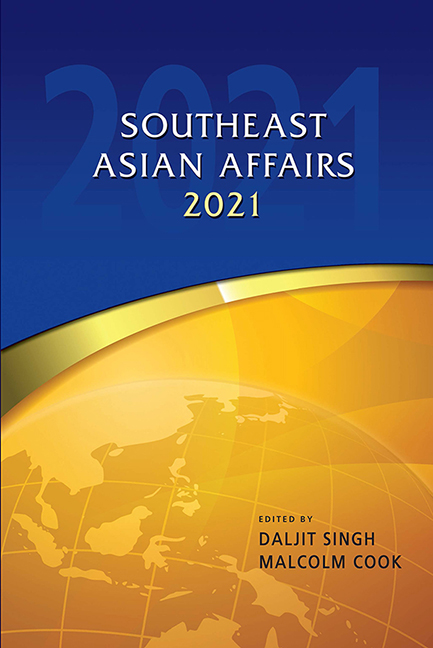The Populist Brand is Crisis: Durable Dutertismo amidst Mismanaged COVID-19 Response
Published online by Cambridge University Press: 09 October 2021
Summary
As with the rest of Southeast Asia and the world, the coronavirus outbreak took the entire Philippines by surprise in early 2020. But the response by the Philippine government was quite distinct compared to those of its neighbours. It placed the entire country in a highly-securitized lockdown—one of the longest and strictest in the world. The series of harsh lockdowns has also been coupled with an order from the president for security officers to use lethal force against violators—“shoot them dead!”, as Philippine president Rodrigo Duterte commanded in April 2020. Yet, close to the end of the year it had become clear that the harsh measures taken by the government had failed to keep the outbreak from turning into a full-blown economic, health, political and social crisis. Along with close to 475,000 confirmed cases and more than 9,200 casualties of the coronavirus recorded by year's end, hunger and poverty among Filipino families and the loss of jobs and economic opportunities reached historical highs. A record 7.6 million Filipino households experienced involuntary hunger, a strikingly high 7.2 million Filipinos were jobless and the economy contracted at an unprecedented rate of 9.5 per cent, making it the worst in Southeast Asia. The COVID-19 pandemic has become a most complex and challenging crisis all over the world, but even more so for the national administration in the Philippines.
But rather than being a curse for the populist Duterte, the pandemic turned out to be a gift. Despite leading one of the worst-managed responses in the region to the outbreak, the crisis gave Duterte an opportunity to renew the public mandate for his illiberal agenda. The series of spectacular failures by his administration in curbing the spread of the virus did not dent his popularity. At the height of the pandemic, a 50 per cent spike in the number of casualties from the administration's brutal war on drugs was recorded, and Duterte's assaults on democracy and human rights worsened. By September 2020, public trust and support for Duterte's performance was at a record-high 91 per cent. This is his highest rating so far, and this remarkably high score sets him apart from all the past presidents in the post-authoritarian years. Duterte is now the most powerful and popular Philippine president since the country's return to democracy in 1986.
- Type
- Chapter
- Information
- Southeast Asian Affairs 2021 , pp. 257 - 274Publisher: ISEAS–Yusof Ishak InstitutePrint publication year: 2021

